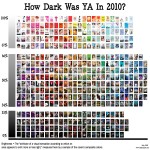On Monday I talked about why I wouldn’t recommend an MFA to an aspiring writer, and I must admit that I feel a little like the black sheep of the MFA community. Lest you all start to think that I’m just hating on grad school just to be contrary, I thought I’d do a post about the positive sides of my MFA experience. The truth is, I both loved and un-loved the experience, and I’m OK with that dichotomy. Here are 4 Great Things I Learned from the MFA.
Writing is a Priority. When you invest the kind of time, effort–and let’s face it, finances–to go to graduate school, you have to make writing a priority. Going back to school is a way of showing yourself and those around you that this writing habit is here to stay and you’re making it a top priority in your life.
When you make writing a priority, that’s when you start seeing results in the quality of your work. I see this in a lot of my students. At some point, they make a shift from dragging their feet to not being able to tear themselves away from their writing. And that’s when the magic starts happening. It’s really true: the more you write, the harder it is NOT to write, and when you hit that sweet-spot your writing starts to improve dramatically.
You Have to Read the Literature. Until I went to graduate school, I thought that “literature” meant the classics-with-a-capital-C. When I took my literature study courses in children’s writing, however, I noticed that the syllabus was a mix of classics, contemporary books and even some books I wouldn’t have considered “worthy” of serious study because they seemed rather silly.
The professor in this class helped me see the “literature” as the whole body of work that my own writing fits into and for the first time, I started reading books I would usually consider “pleasure reading” as part of my own personal literature study. Now I no longer pass value judgments on what I choose to read, but select books based on how they broaden my understanding of how my work fits into this greater context.
A different literature professor taught me another valuable lesson about reading. On the first day of class he said: “There are millions of books in the world and life’s too short to read them all. I don’t want you wasting your precious reading time on something you can’t get through. If you can’t get past page 5, stop.” Of course, if we chose to stop reading an assigned book, we then had to defend our reasons for that decision in the following class, but this professor showed me that I had to respect my own reading time. Since then, I’ve stopped forcing myself to get through books that just don’t resonate with me. Yes, I give them an honest-to-goodness try, but if I can’t get past the first chapter, I stop. Life’s too short, after all.
You Can Survive a Harsh Critique. Let’s face it, some fellow MFA students are more well-versed in the art of tact than others. Sooner or later, you’re going to get a harsh critique and you have to learn to deal with it. For me, the pivotal moment came when I stopped thinking of the work as an extension of me. This realization came sometime in my second semester, when I started submitting my work to literary magazines. Getting rejection after rejection forced me to take a step back and say: “You know what? I am not the work. I’m me, and the work’s the work. They are two separate things and if the work gets rejected it’s nothing personal.” After that, my attitude in workshop went from being “please be nice” to “bring it on!”
When It Comes to a Writing Community, You Get Back What You Put Into It. Although the program itself introduced me to a phenomenal writing community, I quickly realized that this was only the beginning. I started making conferences a priority. I began connecting with other writers through blogs and twitter and in-person events. It became brutally obvious that while the MFA did provide a ready-made and wonderful community, to keep it up post-graduation I would have to put in a little more time and effort.
Every semester, we were required to attend 8 events in the writing community. My first semester in the program, I attended only events sponsored by the school (there were plenty to choose from, after all, and I didn’t know where else to look). Slowly, as I started getting more plugged into the writing world, I began to branch out. My last semester, I think I went to 12 or 15 events, only 4 of which were school-sponsored. The others were readings, conferences, workshops and talks I found by connecting with fellow writers. This experience taught me that MFA events are a great place to start, but in the end the goal is to connect with the greater writing community.
Any of these resonate with you? Which do you find most challenging? (For me it’s definitely the first one… making writing a priority.)







 Call me Gabi (pronounced gah-BEE). I'm a writer, freelance teacher, and a lover of books and words. I'm also the instigator of DIY MFA. iggi's my sidekick, but he thinks he's the brains behind this operation.
Call me Gabi (pronounced gah-BEE). I'm a writer, freelance teacher, and a lover of books and words. I'm also the instigator of DIY MFA. iggi's my sidekick, but he thinks he's the brains behind this operation.
 Goodbye is for Sissies
Goodbye is for Sissies YA Cafe: What YA Book are You Thankful For?
YA Cafe: What YA Book are You Thankful For? YA Cafe: Why I Love Dark YA
YA Cafe: Why I Love Dark YA YA Cafe: YA Appreciation Month
YA Cafe: YA Appreciation Month
Comments on this post
I agree with all of your points – these are exactly why I’m glad I got an MFA. 🙂
20. July - 1:38 pmI applied to obtain my MFA two years and received rejection letters from all of my schools. I am going to try again because of all the reasons you mentioned in your post.
Thank you so much for sharing your insights. If it’s one thing I can’t quite do yet is make writing a priority. I’ll write a story, leave it alone for three months and then come back to it if I’m in a writing workshop.
Great post!!
27. July - 9:47 am